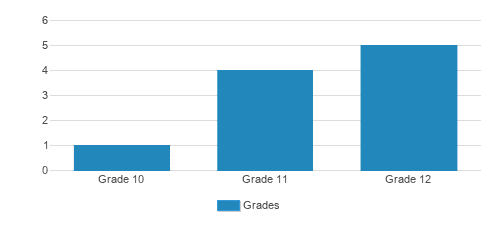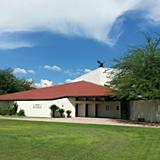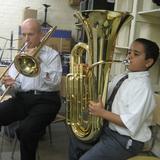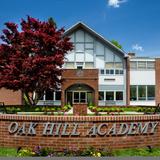Desert Willow's full time school is a small high school community designed to not exceed the ratio of one teacher per six students.
The purpose is to create a physically and emotionally safe environment focusing on student success, both in school as well as after graduation.
Each student's curriculum is developed on an individualized basis, considering their academic history as well as their goals for the future.
Quick Stats (2025)
- Top Ranked AZ School
- School Type: Special Education School
- Grades: 10-12
- Enrollment: 10 students
- Average class size: 4 students
- Application Deadline: None / Rolling
- Source: National Center for Education Statistics (NCES)
Top Rankings
Desert Willow Educational Services ranks among the top 20% of private schools in Arizona for:
Category
Attribute
Advanced Degrees
School Overview
School Type
Religious Affiliation
Grades Offered
Grades 10-12
Offers Post-Graduate Year
Yes
Learning Difference Programs
Yes
Learning Programs Supported
ADHD, Anxiety, Dyslexia, LD, Asperger
Year Founded
1998
Summer School Offered
Yes
Student Body
Total Students
10 students
Student Body Type
Co-ed
% Students of Color
10%
State avg.: 38%
Students by Grade

Academics and Faculty
Total Classroom Teachers
2 teachers
Student : Teacher Ratio
5:1
National avg.: 13:1
% Faculty w/Advanced Degree
99%
Average Class Size
4 students
Classroom Dress Code
Casual
Tuition and Acceptance Rate
Admission Deadline
None / Rolling
School Notes
- The school at Desert Willow provides a physically and emotionally safe environment for learners. Students who have learning disabilities, ADHD/ADD, Aspergers, or who are under-achievers can receive a high-quality education that focuses on their learning strengths. Desert Willow's curriculum focuses on the development of skills in reading, writing, math, and learning strategies as outlined in the Arizona State Standards. Accommodations and modifications are provided for those students who require them. This includes anything from individualized course instruction to advanced-placement classes. As a part of their schedule, students participate in computer-skills classes, art projects, and weekly field trips with an emphasis on outdoor education and culture. The acquisition of academic skills is obtained by providing small group instruction 1:6 ratio of teachers to students. Subjects are taught with an emphasis on the use of Howard Gardner's concept of multiple intelligences so that students can experience learning through the use of their strengths. In order to instill a sense of belonging, students learn how to become a valued and respected member of their school community. Social skills development is emphasized as an integrated part of the school day. Part of the social development curriculum is taken from the "Tribes" program. Through this program, students learn to live and work cooperatively. Group exercises focus on developing a sense of respect and compassion for one's self and others as well as an appreciation of individual differences.
Source: National Center for Education Statistics (NCES)
Frequently Asked Questions
What schools are Desert Willow Educational Services often compared to?
Desert Willow Educational Services is often viewed alongside schools like Abbie School, Intermountain Academy by visitors of our site.
What is Desert Willow Educational Services's ranking?
Desert Willow Educational Services ranks among the top 20% of private schools in Arizona for: Highest percentage of faculty with advanced degrees.
When is the application deadline for Desert Willow Educational Services?
The application deadline for Desert Willow Educational Services is rolling (applications are reviewed as they are received year-round).
In what neighborhood is Desert Willow Educational Services located?
Desert Willow Educational Services is located in the Rillito neighborhood of Tucson, AZ.
School Calendar
View the Desert Willow Educational Services yearly calendar below. Note key dates such as:
Event
Date
Last Day of School - Half Day 12 pm Dismissal
May 23, 2025 (Friday)
School Reviews
Endorse Desert Willow Educational Services. Endorsements should be a few sentences in length. Please include any comments on:
- Quality of academic programs, teachers, and facilities
- Availability of music, art, sports and other extracurricular activities
- Academic or athletic awards
Recent Articles

Dealing with Bad Press
This article provides guidance on how private schools can effectively manage crises and negative publicity. It emphasizes the importance of having robust protocols, transparent communication, and a proactive approach to addressing issues. The article highlights the challenges posed by social media and the media's tendency to view private schools negatively, offering strategies for heads of schools, parents, and staff to navigate these situations.

A Parent's Guide To Understanding High School Teaching Methods
This comprehensive guide helps parents navigate the various teaching methods used in today's high school classrooms. By understanding these approaches, you'll be better equipped to support your teen's learning journey, communicate effectively with teachers, and create a complementary learning environment at home.

February 08, 2025
Social Emotional Learning: Education's Hidden SymphonyA musician's perspective on Social Emotional Learning reveals how this educational framework orchestrates success through five essential emotional competencies.


















